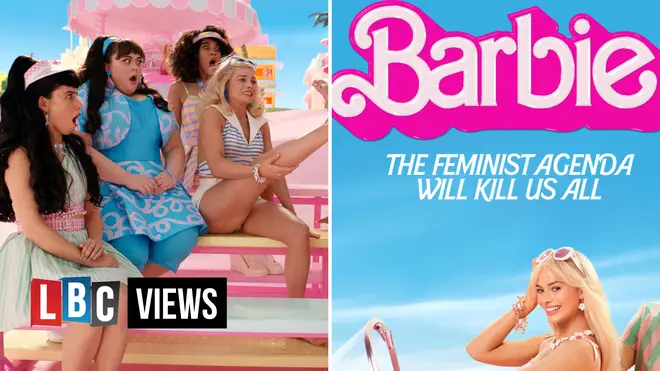
Oli Dugmore 4am - 7am
23 July 2023, 14:31 | Updated: 23 July 2023, 22:14

The Barbie film is just another example of damaging feminist stereotypes.
First and foremost, I have to say it is a great movie. One that holds a mirror up to society in the most real - and in some moments quite an unnerving - way. It delves into the daily contradictory struggles women are faced with against a backdrop of unquestioned patriarchalism.
Besides the obvious inability to represent actual body inclusivity beyond the token fat character portrayed by My Mad Fat Diary’s Sharon Rooney, the film suggested we can only do extremes. This or that. Male dominance or female dominance.
Barbie Land begins as a matriarchy totally constructed for and by the success of women - who runs the world? Girls, right? But this extreme women-led world leaves the Ken’s feeling less than, a secondary character existing only to serve a purpose to Barbie, as and when she chooses. And when Ken discovers the indiscreet patriarchy of the real world he adopts the ideology and brings it back to Barbie Land, thus creating ‘Kendom’.
Kendom is what I imagine as every woman’s nightmare, a world in which women are objects and men rule everything. A reality from the not-too-distant past, a system feminists have fought to get away from. So, naturally, the storyline moves to ‘stereotypical’ Barbie resolving this newly formatted patriarchy. Doing so by retraining the Barbies who have been brainwashed into bimboism.

Rachel Johnson expresses her concerns with the new Barbie film
This is where the actual point of feminism is so clearly missed. A clear target, an open goal but alas a clumsy shooter left us with this unambitious ending.
After pitting the Ken’s against one another Barbie Land is almost restored. Ryan Gosling’s Ken has a whole moment where he describes the feeling of being a secondary character, which is then seemingly fixed by Margot Robbie’s Barbie saying a lot of words which didn’t particularly move me but were tied up nicely with a clever ‘I am Kenough’ slogan.
Barbie doesn’t love Ken and therefore refuses to live in a partnership with him. And from this, instead of allowing Ken and Barbie to simultaneously exist as valuable, strong characters, Barbie decides to become a human.
So we are never permitted a Barbie Land which embodies true feminism. The film fails to dismantle the typical trope. It fails to stress that feminism is about equality of the sexes. Equal rights not extremes. Not a Barbie Land run by and for women. Not a Kendom dominated by men. But genuine equivalence between genders.
I took 1 star reviews of #Barbie from furious men on letterboxd and put them on the posters because it makes the film seem ever cooler. pic.twitter.com/V4YzmnB8bj
— TechnicallyRon (@TechnicallyRon) July 23, 2023
The end of the film mocks how the Ken’s of Barbie Land will spend the next years fighting to become as successful in their land as women are in the real world today. But that snide comment is not enough. To most that may even go unnoticed.
READ MORE: 'I did the Barbenheimer double billing. Both films are great - but don’t watch them together'
Imagine all the reluctant boyfriends who were dragged to the cinema to see this film. All the men moved by Ryan Gosling’s unthreatened masculinity. This could have been the moment to showcase the beauty of what feminism is and can be. An opportunity to demonstrate the ideals that women and allies have been advocating for.
But instead, I fear most men will leave theatres with a clichéd view of feminism. A belief that this is a movement driven by the need for women to rule over men. And that is damaging.